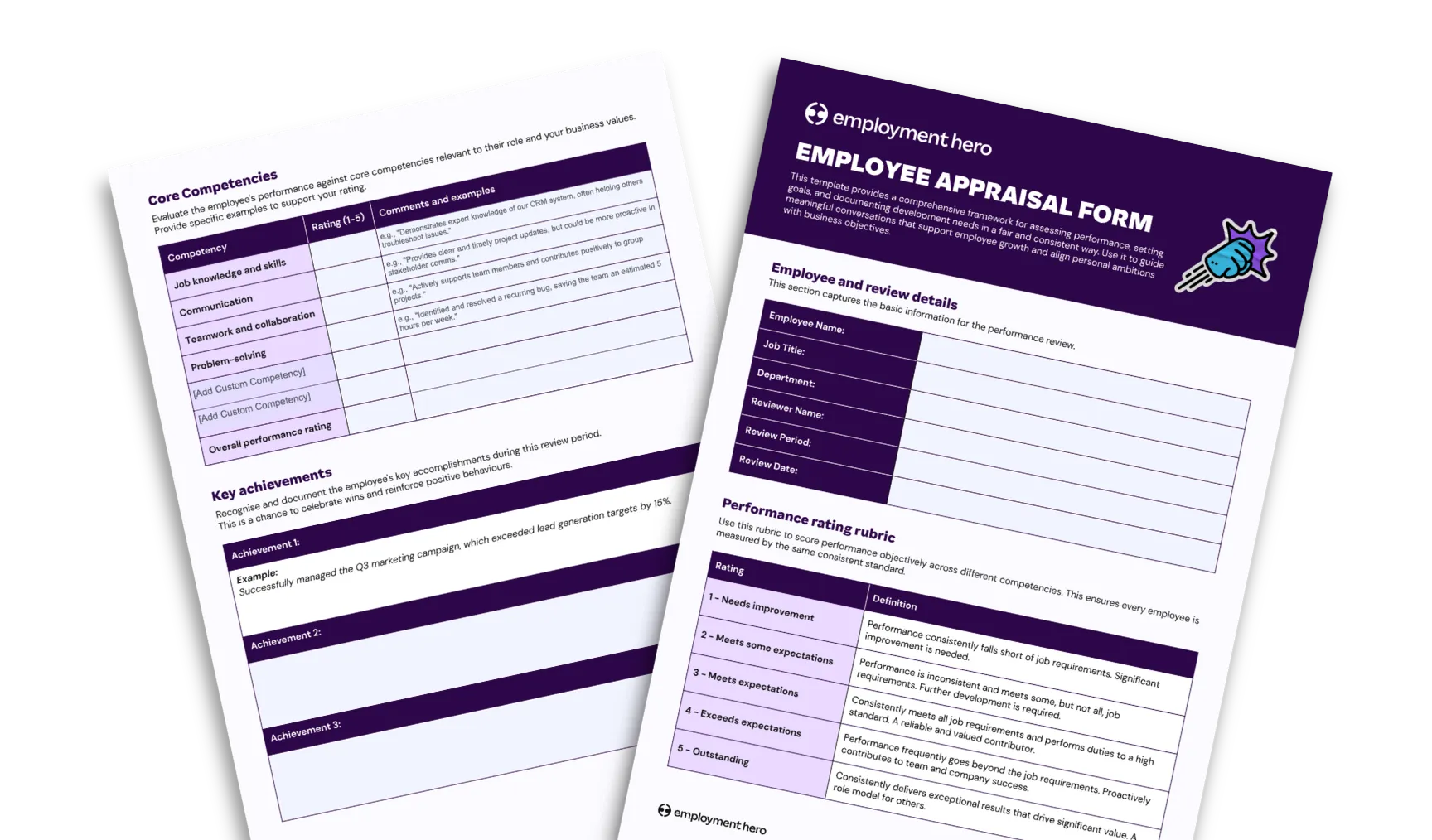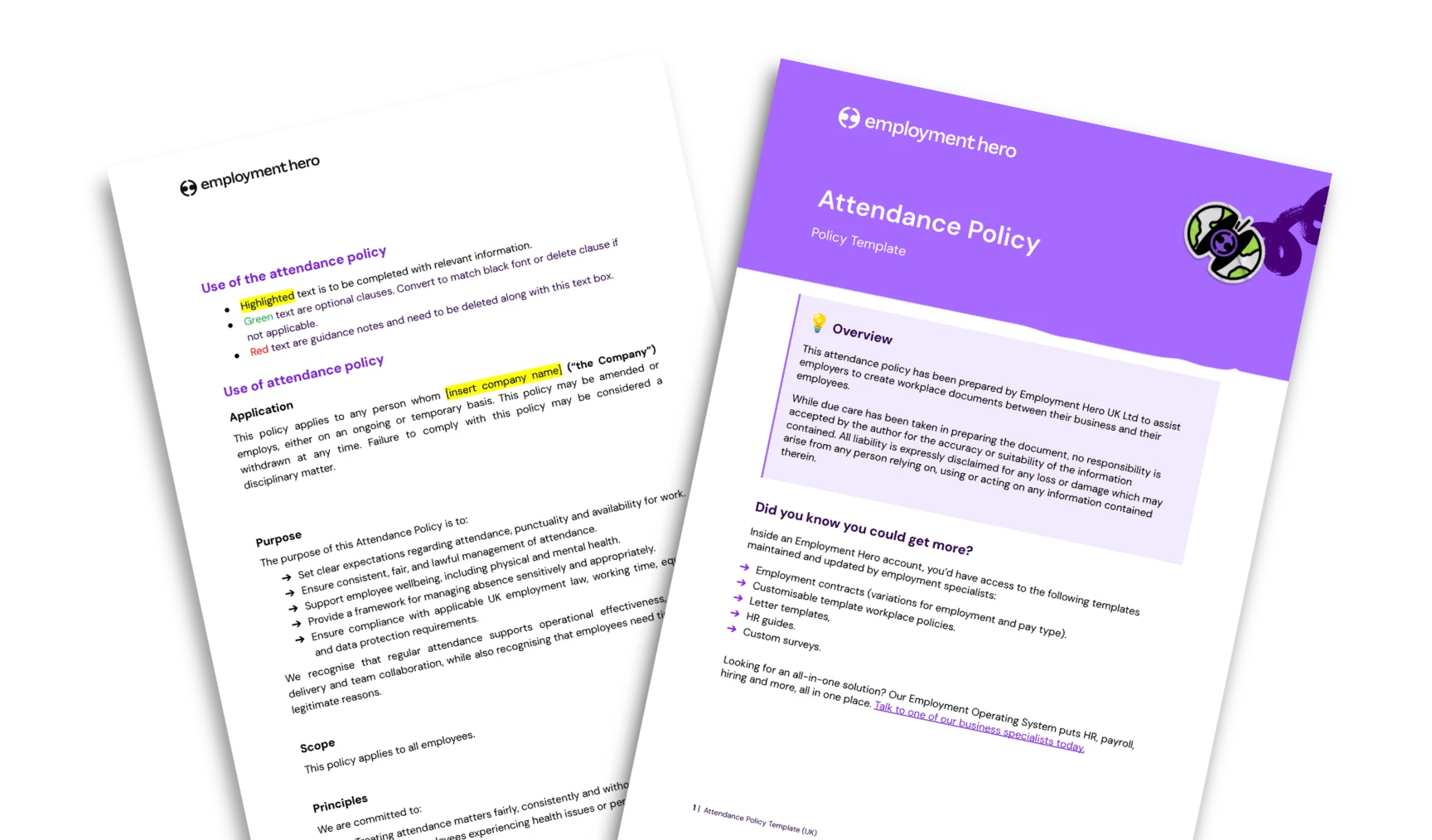Understanding HR and Employment Law: Free Factsheet
Published
Understanding HR and Employment Law: Free Factsheet
Published
1 min read
In the UK businesses are required to abide by some key Human Resources (HR) and employment laws. But for small or medium sized business owners, it can be challenging to keep up with the ever changing legislation.
The problem is, getting it wrong and failing to comply with employer obligations is not an option. Not abiding by UK workplace legislation comes at a price and can result in hefty fines, costly legal fees as well as repetitional damage to the company, alongside low staff morale. None of which are things businesses want to face.
It’s clear that ensuring you are compliant is essential, but how do you know what the legislations actually are?
Employment Hero is here to help, so we’ve put together a handy factsheet to break down the key HR and employment law obligations that all employers need to know about.
What’s inside our HR and employment law factsheet
This up-to-date factsheet (updated August 2025) is designed to give business owners, leaders and Human resources professionals a clear, practical overview of employer obligations.
Download the HR and employment law factsheet to learn about:
- Employee rights & contracts
- Disciplinary & grievance processes
- Leave entitlements
- Termination & redundancy
- Templates and checklists
Why HR and employment law go hand in hand
Although HR and employment law seem like two completely different business functions, they’re actually two sides of the same coin. And for any business to run smoothly and remain compliant, the two need to be aligned.
Human Resources (HR): The department in a business that manages employee relations, hiring, performance, development, wellbeing and workplace culture. In simple terms, it’s the team that focuses on taking care of people at work. This spans the entire employee lifecycle, from hiring and onboarding to retirement or resignation.
Employment law: This is the set of legal obligations that governs relationships between employers and employees. It covers things like employee rights, minimum wage, discrimination, working hours, safety, unfair dismissal and more. This legislation ensures workplaces are fair, safe and respectful.
Why HR and employment law can’t be treated separately
Human resources is the practical side of labour legislation. Human resources professionals need to be able to interpret legal obligations and to bring those obligations to life in the workplace.
For example:
- UK legislation might say an employee is entitled to parental leave.
- Human resources is responsible for creating and enforcing a leave policy, ensuring the process is compliant, accessible and equitable.
This partnership between HR and employment law is critical. If human resource teams don’t apply legislation correctly, businesses can face legal consequences, reputational damage and employee dissatisfaction.
Common risks when HR and legal aren’t aligned
Some common areas human resources teams need to ensure they are HR compliant UK on include:
1. Wrongful Dismissal
Terminating an employee is never something businesses want to think about, but there are circumstances when there is no other option. However, terminating a member of the team without following fair procedures or lacking a legitimate reason can result in tribunal claims or legal action.
To remain compliant, human resources professionals must ensure that dismissals are lawful, justified and documented properly.
2. Poor Documentation
Having up-to-date documentation is a must for all businesses, not only because it keeps things organised, but also to protect the company. Failure to document performance concerns, investigations or contacts can make it difficult to defend the business if legal issues arise.
Human resources teams need to maintain clear, accurate records that align with legal requirements.
3. Tribunal Claims
Employees who feel unfairly treated may bring claims for unfair dismissal, discrimination or harassment. If HR and employment law aren’t aligned and legislation hasn’t been followed, the business is at greater risk of losing the case. This can be costly, both financially and reputationally.
Common compliance challenges facing UK employers
The reality is, most business owners and human resource teams are time poor and often it’s hard to find the time to keep on top of small business legislation. But with evolving obligations and admin gaps, small mistakes can quickly become big problems.
Some of the main challenges faced by small businesses include:
- Staying up-to-date with legislation: Rules around sick leave, redundancy, flexible working and holiday entitlements are subject to change and keeping up can feel like a full-time job in itself.
- Balancing compliance with culture: Many businesses want to build inclusive, people-first workplaces, but aren’t sure how to enforce policies in a way that’s both fair and legally compliant.
- Poor documentation: Incomplete employee files, outdated templates or missing contracts leave employers vulnerable in the event of disputes or tribunal claims.
- Fear of mistakes: Whether it’s mishandling a grievance or issuing an incorrect termination letter, many employers worry about getting it wrong and facing financial or reputational damage as a result.
How this resource helps your business
Created by human resources and legal experts at Employment Hero, this is more than just another human resources or compliance resource. It’s your shortcut to running a compliant, people first business.
This factsheet will help your business to:
- Stay compliant with UK legislation: Get clear, up-to-date guidance on your legal obligations, so you can stop second-guessing what’s required.
- Reduce legal and reputational risk: Avoid costly mistakes like unfair dismissal, poor documentation or mishandled grievances that can lead to tribunal claims.
- Feel confident managing employee issues: Whether it’s performance concerns, redundancy or sick leave, this factsheet helps you act fairly and within the law.
Who should download this guide?
If you’re responsible for people, policies or legal compliance at work, this factsheet is for you. It’s designed to support:
- Small business owners and leaders
- Human resources managers and advisors
- Operations or office managers
- Anyone Involved in hiring, policy or compliance
Stay compliant with Employment Hero
We get it, HR and employment law is complicated. But Employment Hero is here to help. Our HR Advisory service includes unlimited access to HR and employment law advice from a team of experts.
But our Employment Operating System helps you do more than stay compliant. We’ve taken all the traditional elements of employment and integrated them into a seamless, human and AI-powered solution that empowers employers, employees and job seekers alike. Find and hire top talent, with SmartMatch, onboard new hires, automate complex payroll, drive employee engagement and more.
HR and employment law FAQs
The main UK employment laws every business must follow include:
- Employment Rights Act 1996
- National Minimum Wage Act 1998
- Working Time Regulations 1998
- Maternity and Parental Leave Regulations 1999
- Equality Act 2010
- Employment Tribunals Act 1996
- GDPR/ Data Protection Act 2018
- Trade Union and Labour Regulations Act 1992
The person who is responsible for HR compliance in a business depends on the business size.
SMEs
Responsibility: Typically falls to the owner, managing director or an office/operations manager.
These individuals often wear multiple hats and must ensure:
- Contracts are in place
- Policies meet legal standards
- Disciplinary and grievance processes follow the law
- Records (e.g. right-to-work checks, pay, holiday) are kept up to date
Mid-size companies
Responsibility: Usually assigned to an HR manager, HR advisor or people operations team, often with support from leadership and legal counsel.
Their role includes:
- Creating compliant policies and handbooks
- Managing employee relations fairly
- Overseeing onboarding, leave, performance and terminations within legal limits
- Keeping documentation and records legally sound
Larger organisations
Responsibility: Spread across dedicated HR teams, in-house legal teams and line managers (who must follow HR’s guidance).
There may also be:
- HR compliance officers or employment law specialists
- Training programs to ensure line managers understand legal boundaries
Human Resources helps to ensure compliance with employment law by putting it into daily operational use.
This is achieved through:
- Issuing legally compliant contracts
- Creating and updating policies
- Maintaining proper documentation
- Training managers and staff
- Handling employee issues fairly
- Monitoring legislation changes
- Advising leadership teams on risk
If a company breaks employment law in the UK there are consequences. These include:
- Employment tribunals
- Fines and financial penalties
- Reputational damage
- Enforcement by regulators
- Loss of time and resource
UK employment law changes frequently, sometimes in small regulatory updates and other times through major legislative reforms.
Minor updates often impact things such as National Minimum Wage (every April), Statutory sick pay and maternity/paternity pay rates and Holiday pay calculations and can be updated annually.
Major reforms are less frequent and happen every few years. The government may introduce new legislation or amend existing acts, for example:
- The Employment Relations (Flexible Working) Act 2023 expanded employees’ rights to request flexible working.
- The Worker Protection Act, effective from October 2024, introduced new employer duties around workplace harassment.
- The Employment Rights Bill currently before Parliament introduces widespread reforms for unfair dismissal, zero-hours contracts and statutory sick pay
No, you don’t necessarily need formal legal training to manage HR compliance, but you do need the right knowledge, tools and support to do it confidently and correctly.
Here’s a breakdown of what you do and don’t need to manage HR compliance.
|
What you don’t need |
What you do need |
|---|---|
|
A law degree or legal certification. |
A clear understanding of key employment laws and HR obligations |
|
Experience as a solicitor or employment lawyer. |
Up-to-date policies, contracts and documentation aligned with UK legislation |
|
Deep knowledge of case law or tribunal procedures. |
The ability to spot risks and know when to escalate complex issues |
|
Practical tools like templates, checklists and guides |
|
|
Access to professional support when expert advice is needed |
Register for the factsheet
Related Resources
-
 Read more: Performance appraisal form template and guide
Read more: Performance appraisal form template and guidePerformance appraisal form template and guide
Download our appraisal form template to enhance employee performance reviews. Improve feedback processes and growth.
-
 Read more: How to Build an Employee Attendance Policy in 2026
Read more: How to Build an Employee Attendance Policy in 2026How to Build an Employee Attendance Policy in 2026
Learn how to create a fair and effective employee attendance policy in 2026. Discover strategies for managing attendance policies that…
-
 Read more: EOFY HR Audit: What to Review in March
Read more: EOFY HR Audit: What to Review in MarchEOFY HR Audit: What to Review in March
Complete a EOFY HR audit with our practical checklist. Review compliance, people processes and compliance to reduce risk before the…



















